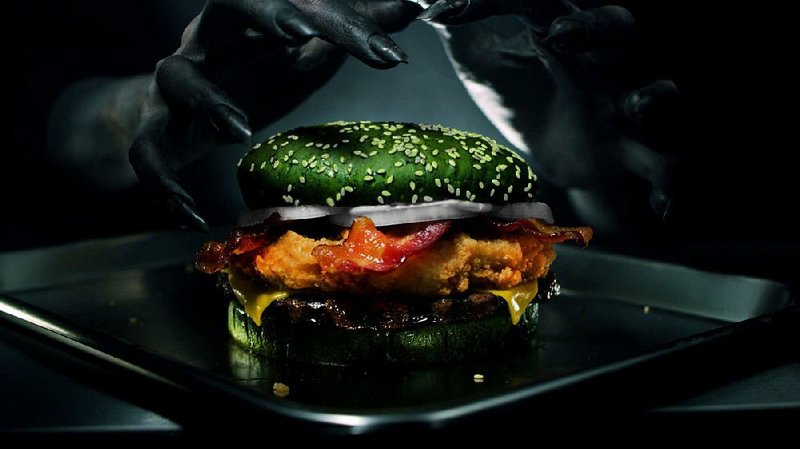Just looking at this burger might be all it takes to give you fast-food nightmares.
It does have a moldy-green colored bun, after all.
This Halloween burger -- known as the "Nightmare King" -- will be at select Burger King restaurants for a limited time through Thursday. But be warned, the burger doesn't just look scary.
"The Nightmare King increases your chances of having nightmares by 3.5 times," Burger King says with a YouTube video promoting the burger. That's according to the results of a "clinical study," the statement says.
The fast-food chain says it worked to prove that the Nightmare King can actually give you nightmares because of its "unique build." The burger includes a "mix of proteins like bacon, chicken and beef," as well as some oozy cheese.
"The hypothesis was that this new burger could cause nightmares," the brand says. "So, the BURGER KING® brand turned to science to validate this."
And that it did, according to a news release from the brand:
"The BURGER KING® Brand Creates a Halloween Sandwich Clinically Proven to Induce Nightmares."
In partnership with the Paramount Trials, Florida Sleep & Neuro Diagnostic Services Inc. and Goldforest Inc., Burger King conducted the clinical, scientific sleep study with 100 participants (or victims) over 10 nights, according to the news release.
Each participant ate the Nightmare King before going to bed, the release states, and doctors and scientists tracked various signals while they slept.
"According to previous studies, 4 percent of the population experiences nightmares in any given night," says Jose Gabriel Medina, a specialized somnologist and the study's lead doctor, according to the statement. "But, after eating the Nightmare King, the data obtained from the study indicated that the incidence of nightmares increased by 3.5 times."
In the promotional video, one participant says that someone in her dream turned into the green-bunned burger.
"The burger then transformed into the figure of a snake," she says.
Another participant says aliens started attacking the boat he was on during his bad dream.
In the release, Medina says the burger can cause nightmares because of the protein and cheese combination. He says it leads to "an interruption of the subjects' REM (Rapid Eye Movement) cycles, during which we experience the majority of our dreams."
But just how scientific was that clinical study? And can it be trusted?
Maybe not, according to LiveScience.
"In reality, the study the burger chain commissioned to find out if the green-bunned combination chicken-beef-and-bacon burger caused nightmares was not designed to prove anything, clinically or not," LiveScience reports. "And what little data there [are] on food and nightmares suggest that, if anything, fast food should reduce bad dreams."
A 2015 study published in the Frontiers of Psychology found that people who prefer fast food actually reported fewer dreams and nightmares than those who preferred organic foods.
"Participants who expressed a preference for fast foods reported less frequent dream recall, as well as fewer recurring dreams, nightmares, and sexual dreams," the study says.
In a 2015 Psychology Today article, Michelle Carr with Dream Factory attempted to determine whether certain foods can cause bad dreams.
"While the authors did find evidence that people believe food can instigate bizarre or disturbing dreams, most commonly accusing dairy, whether these dreams are indeed caused by 'the power of cheese,' or simply misheld beliefs, remains to be seen," she wrote.
LiveScience also reports that because all 100 participants ate the burgers, there was no control group for comparison.
"With no control group, the study can't prove anything about the burger's effect on nightmares," LiveScience reports. Control groups are an "essential part of the scientific method," Matheus Melo Pithon wrote in Evidence-based Orthodontics.
Regardless, Burger King stands by the clinical study, and the brand leaves its customers with this statement:
"Caution: proceed at your own risk. You've been warned."
Style on 10/30/2018
